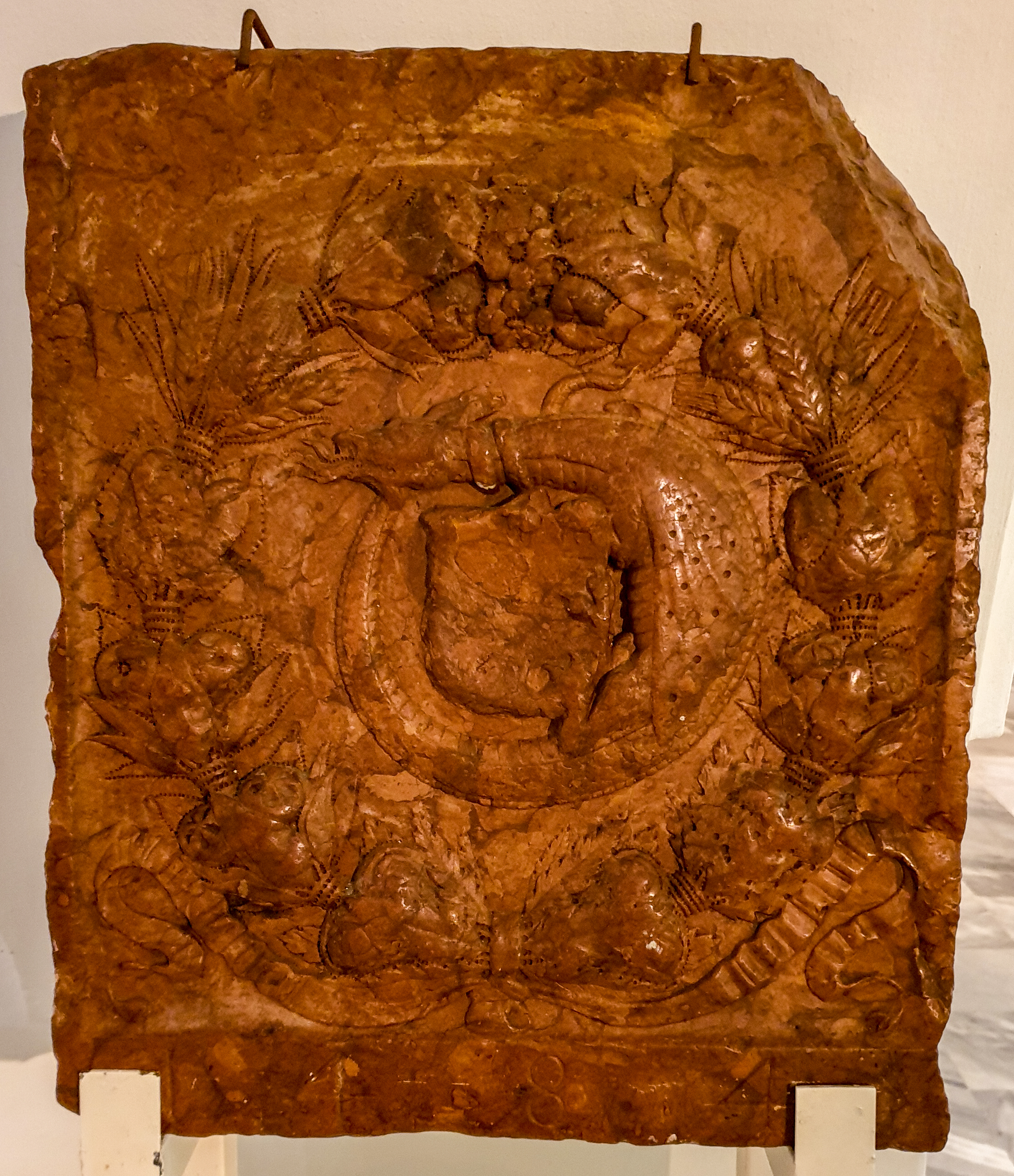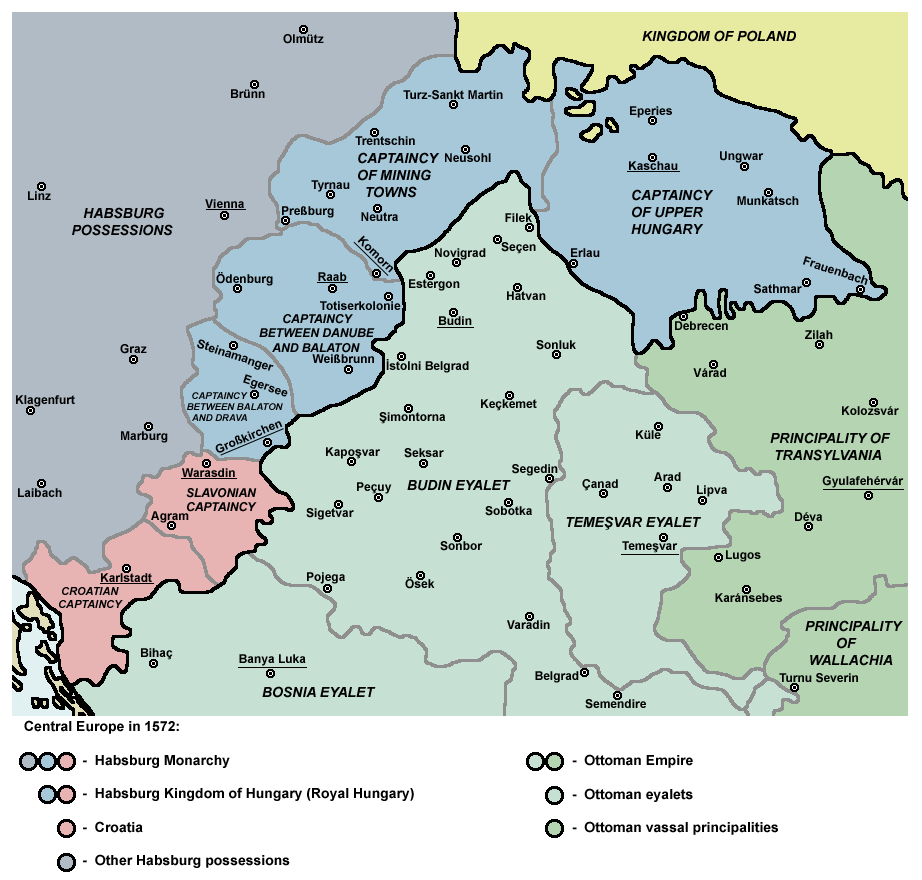|
Balthasar Báthory
Balthasar Báthory de Somlyó ( hu, Báthory Boldizsár; 1560 – 11 September 1594) was a Transylvanian politician from the Báthory family, and like his brother, prince Andrew Báthory, an opponent of the Habsburgs in Transylvania. Biography Balthasar was born around 1560 to a wealthy and powerful family, as son of Hungarian captain Andrew Báthory and his wife Margarita Majláth de Szatmár. He was raised in Kraków, with his younger brother Andrew, at the court of his uncle Stephen Báthory, who became King of Poland in 1576. By the time of Báthory's birth, the Kingdom of Hungary was divided into three parts: A western under the control of the Habsburgs (who also had the title of King of Hungary), a central control of the Ottoman Empire, and in the form of oriental Principality of Transylvania, ruled by the Hungarian nobility. Stephen Báthory was not only king of Poland at that time, but earlier, in 1571, was elected Prince of Transylvania, which did not give up ti ... [...More Info...] [...Related Items...] OR: [Wikipedia] [Google] [Baidu] |
Báthory Family
The Báthory family ( pl, Batory) was a Hungarian noble family of the Gutkeled clan. The family rose to significant influence in Central Europe during the Late Middle Ages, holding high military, administrative and ecclesiastical positions in the Kingdom of Hungary. In the early modern period, the family brought forth several Prince of Transylvania, Princes of Transylvania and one King of Poland and Grand Duke of Lithuania (Stephen Báthory). Origins The Báthory family belonged to the ''Gutkeled The coat-of-arms of the Hungarian Gutkeled clan Gutkeled (spelling variants: Gut-Keled, Guthkeled, Guth-Keled) was the name of a ''gens'' (Latin for "clan"; ''nemzetség'' in Hungarian) in the Kingdom of Hungary, to which a number of Hungarian nob ...'', a clan of Hungary, Hungarian nobles, which traced its descent to the Swabian brothers ''Gut'' and ''Kelad'', who immigrated into Hungary from the castle ''Stof'' (probably Staufen, Germany, Staufen im Breisgau or Hohenstaufen in W� ... [...More Info...] [...Related Items...] OR: [Wikipedia] [Google] [Baidu] |
Ottoman Hungary
Ottoman Hungary ( hu, Török hódoltság) was the southern and central parts of what had been the Kingdom of Hungary in the late medieval period, which were conquered and ruled by the Ottoman Empire from 1541 to 1699. The Ottoman rule covered almost the entire region of the Great Hungarian Plain (except the northeastern parts) and Southern Transdanubia. The territory was invaded and annexed to the Ottoman Empire by Sultan Suleiman the Magnificent between 1521 and 1541. The north-western rim of the Hungarian kingdom remained unconquered and recognised members of the House of Habsburg as Kings of Hungary, giving it the name "Royal Hungary". The boundary between the two thereupon became the frontline in the Ottoman–Habsburg wars over the next 150 years. Following the defeat of the Ottomans in the Great Turkish War, most of Ottoman Hungary was ceded to the Habsburgs under the Treaty of Karlowitz in 1699. During the period of Ottoman rule, Hungary was divided for administrativ ... [...More Info...] [...Related Items...] OR: [Wikipedia] [Google] [Baidu] |
Executed Hungarian People
Capital punishment, also known as the death penalty, is the state-sanctioned practice of deliberately killing a person as a punishment for an actual or supposed crime, usually following an authorized, rule-governed process to conclude that the person is responsible for violating norms that warrant said punishment. The sentence ordering that an offender is to be punished in such a manner is known as a death sentence, and the act of carrying out the sentence is known as an execution. A prisoner who has been sentenced to death and awaits execution is ''condemned'' and is commonly referred to as being "on death row". Crimes that are punishable by death are known as ''capital crimes'', ''capital offences'', or ''capital felonies'', and vary depending on the jurisdiction, but commonly include serious crimes against the person, such as murder, mass murder, aggravated cases of rape (often including child sexual abuse), terrorism, aircraft hijacking, war crimes, crimes against hum ... [...More Info...] [...Related Items...] OR: [Wikipedia] [Google] [Baidu] |
Hungarian Politicians
Hungarian may refer to: * Hungary, a country in Central Europe * Kingdom of Hungary, state of Hungary, existing between 1000 and 1946 * Hungarians, ethnic groups in Hungary * Hungarian algorithm, a polynomial time algorithm for solving the assignment problem * Hungarian language Hungarian () is an Uralic language spoken in Hungary and parts of several neighbouring countries. It is the official language of Hungary and one of the 24 official languages of the European Union. Outside Hungary, it is also spoken by Hungarian ..., a Finno-Ugric language spoken in Hungary and all neighbouring countries * Hungarian notation, a naming convention in computer programming * Hungarian cuisine, the cuisine of Hungary and the Hungarians See also * * {{disambiguation Language and nationality disambiguation pages ... [...More Info...] [...Related Items...] OR: [Wikipedia] [Google] [Baidu] |
Hungarian Nobility In Transylvania
Hungarian may refer to: * Hungary, a country in Central Europe * Kingdom of Hungary, state of Hungary, existing between 1000 and 1946 * Hungarians, ethnic groups in Hungary * Hungarian algorithm, a polynomial time algorithm for solving the assignment problem * Hungarian language, a Finno-Ugric language spoken in Hungary and all neighbouring countries * Hungarian notation, a naming convention in computer programming * Hungarian cuisine Hungarian or Magyar cuisine is the cuisine characteristic of the nation of Hungary and its primary ethnic group, the Magyars. Traditional Hungarian dishes are primarily based on meats, seasonal vegetables, fruits, bread, and dairy products. ..., the cuisine of Hungary and the Hungarians See also * * {{disambiguation Language and nationality disambiguation pages ... [...More Info...] [...Related Items...] OR: [Wikipedia] [Google] [Baidu] |
1594 Deaths
Events January–June * March 21 – Henry IV enters his capital of Paris for the first time. * April 17 – Hyacinth of Poland is canonized. * May ** Uprising in Banat of Serbs against Ottoman rule ends with the public burning of Saint Sava's bones in Belgrade, Serbia. ** Nine Years' War (Ireland): Hugh O'Neill, 2nd Earl of Tyrone and Hugh Roe O'Donnell form an alliance to try to overthrow English domination. * June 5 – Willem Barents makes his first voyage to the Arctic Ocean, in search of the Northeast Passage. * June 11 – Philip II of Spain recognizes the rights and privileges of the local nobles and chieftains in the Philippines, which paves the way for the stabilization of the rule of the Principalía. * June 22– 23 – Anglo-Spanish War: Action of Faial – In the Azores, an English attempt to capture the large Portuguese carrack ''Cinco Chagas'', reputedly one of the richest ever to set sail from the East Indies ... [...More Info...] [...Related Items...] OR: [Wikipedia] [Google] [Baidu] |
1560 Births
Year 156 ( CLVI) was a leap year starting on Wednesday (link will display the full calendar) of the Julian calendar. At the time, it was known as the Year of the Consulship of Silvanus and Augurinus (or, less frequently, year 909 ''Ab urbe condita''). The denomination 156 for this year has been used since the early medieval period, when the Anno Domini calendar era became the prevalent method in Europe for naming years. Events By place America * The La Mojarra Stela 1 is produced in Mesoamerica. By topic Religion * The heresiarch Montanus first appears in Ardaban ( Mysia). Births * Dong Zhao, Chinese official and minister (d. 236) * Ling of Han, Chinese emperor of the Han Dynasty (d. 189) * Pontianus of Spoleto, Christian martyr and saint (d. 175) * Zhang Zhao, Chinese general and politician (d. 236) * Zhu Zhi, Chinese general and politician (d. 224) Deaths * Marcus Gavius Maximus, Roman praetorian prefect * Zhang Daoling, Chinese Taoist Ta ... [...More Info...] [...Related Items...] OR: [Wikipedia] [Google] [Baidu] |
Holy Roman Empire
The Holy Roman Empire was a political entity in Western, Central, and Southern Europe that developed during the Early Middle Ages and continued until its dissolution in 1806 during the Napoleonic Wars. From the accession of Otto I in 962 until the twelfth century, the Empire was the most powerful monarchy in Europe. Andrew Holt characterizes it as "perhaps the most powerful European state of the Middle Ages". The functioning of government depended on the harmonic cooperation (dubbed ''consensual rulership'' by Bernd Schneidmüller) between monarch and vassals but this harmony was disturbed during the Salian period. The empire reached the apex of territorial expansion and power under the House of Hohenstaufen in the mid-thirteenth century, but overextending led to partial collapse. On 25 December 800, Pope Leo III crowned the Frankish king Charlemagne as emperor, reviving the title in Western Europe, more than three centuries after the fall of the earlier ancient Weste ... [...More Info...] [...Related Items...] OR: [Wikipedia] [Google] [Baidu] |
Sándor Kendi
Sándor Kendi de Szarvaskend (''Kendy''; ? – 30 August 1594)Markó 2006, p. 113. was a Hungarian noble in the Principality of Transylvania, member of the Royal Council, who served as Governor of Transylvania for the underage voivode Sigismund Báthory from 6 March 1583 to 1 May 1585. Family His father was Mihály Kendi, brother of voivode Ferenc Kendi and Antal Kendi who were executed by Isabella Jagiellon in 1558. His mother was Mihály's first (Zsófia Szilvásy) or second wife (Katalin Bánffy). Sándor Kendi married twice: his wives were Klára Patóchi and Anna Almádi. He had four children: * Zsuzsanna, her first husband was Balthasar Báthory * Krisztina, her second husband was Farkas Kovacsóczy * Zsófia * István, Chancellor of Transylvania (1608–1610), probably he was the last male member of the Kendi family. Career He started his work at the Transylvanian Chancellery in 1565. He became secretary of the Chancellery in 1568. He served as envoy of John Sigi ... [...More Info...] [...Related Items...] OR: [Wikipedia] [Google] [Baidu] |
Sigismund Báthory
Sigismund Báthory ( hu, Báthory Zsigmond; 1573 – 27 March 1613) was Prince of Transylvania several times between 1586 and 1602, and Duke of Racibórz and Opole in Silesia in 1598. His father, Christopher Báthory, ruled Transylvania as voivode (or deputy) of the absent prince, Stephen Báthory. Sigismund was still a child when the Diet of Transylvania elected him voivode at his dying father's request in 1581. Initially, regency councils administered Transylvania on his behalf, but Stephen Báthory made János Ghyczy the sole regent in 1585. Sigismund adopted the title of prince after Stephen Báthory died. The Diet proclaimed Sigismund to be of age in 1588, but only after he agreed to expel the Jesuits. Pope Sixtus V excommunicated him, but the ban was lifted in 1590, and the Jesuits returned a year later. His blatant favoritism towards the Catholics made him unpopular among his Protestant subjects. He decided to join the Holy League against the Ottoman Empire. Since he ... [...More Info...] [...Related Items...] OR: [Wikipedia] [Google] [Baidu] |
Voivode
Voivode (, also spelled ''voievod'', ''voevod'', ''voivoda'', ''vojvoda'' or ''wojewoda'') is a title denoting a military leader or warlord in Central, Southeastern and Eastern Europe since the Early Middle Ages. It primarily referred to the medieval rulers of the Romanian-inhabited states and of governors and military commanders of Hungarian, Balkan or some Slavic-speaking populations. In the Polish-Lithuanian Commonwealth, ''voivode'' was interchangeably used with ''palatine''. In the Tsardom of Russia, a voivode was a military governor. Among the Danube principalities, ''voivode'' was considered a princely title. Etymology The term ''voivode'' comes from two roots. is related to warring, while means 'leading' in Old Slavic, together meaning 'war leader' or 'warlord'. The Latin translation is for the principal commander of a military force, serving as a deputy for the monarch. In early Slavic, ''vojevoda'' meant the , the military leader in battle. The term has ... [...More Info...] [...Related Items...] OR: [Wikipedia] [Google] [Baidu] |



.jpg)
.png)